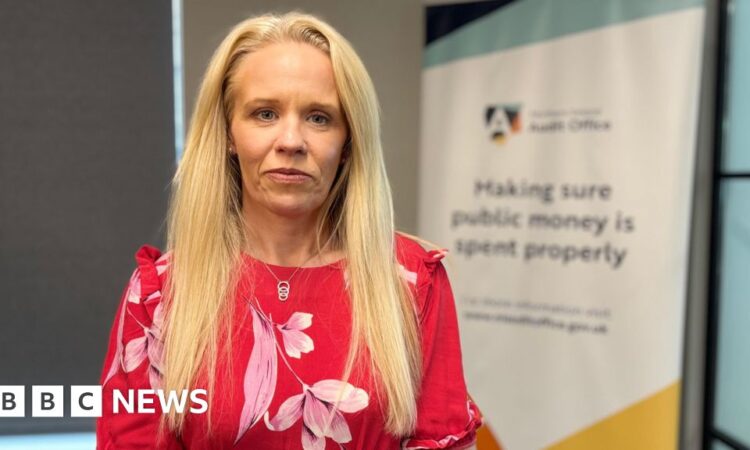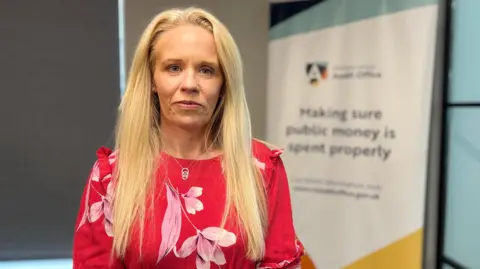
Patrick FeeBBC News NI business correspondent
 BBC
BBCThe Northern Ireland Audit Office has said it “cannot conclude” that the Department for the Economy’s implementation of its multi-million pound green energy strategy is “value for money”.
Since 2020, £107m has been spent in a bid to deliver net zero targets and affordable energy, but an Audit Office report said there is a “very significant risk” that two of the three key targets will be missed by 2030.
“Significant flaws” were found in its implementation, while other key metrics were not measured for years.
The department said it remained committed to achieving the targets, despite the report finding it achieved only 1% of one energy saving target it was supposed to implement.
Comptroller and auditor general Dorinnia Carville said it was “very concerning” that at this stage that two out of the legally binding three targets in the strategy are at “significant risk” of not being met.
The energy strategy was published in 2021 to comply with UK-wide requirements to reduce emissions.
It aimed to help deliver net-zero and ensure affordable energy for businesses and consumers.
Ms Carville said the Audit Office had raised concerns around governance and oversight, because “it was not until September 2024, over two and a half years after the strategy was first published that the group set up to oversee actually looked at whether the action plans were in fact contributing to the achievement of the targets”.
“Because there has been no evidence to indicate that the actions have delivered significantly on the targets of the strategy, we cannot conclude that it is value for money,” she said.
 Getty Images
Getty ImagesJust 1% of the targeted energy saving from buildings and industry has been achieved since the strategy launched, while the target for electricity from renewable sources currently faces a 35% shortfall.
Governance is another key issue in the report.
The energy strategy oversight group, made up of officials from a number of departments, came in for criticism for failing to track the strategy’s progress against its targets.
Economy Minister Caoimhe Archibald said her department is “taking on board the recommendations from the Audit Office and we’ll be implementing them”.
“We have statutory targets to meet and we are making good progress, but we will be reviewing all of that and we’ll be publishing that report before the end of the year,” she added.
Of the £107m, about £85m has been spent on capital projects, while the remaining £22m has been paid in departmental staffing costs since development began in 2020.
“Eight or nine million a year of savings is being generated because of that investment, and it shows the actual public sector leadership in terms of decarbonisation,” the economy minister added.
The Audit Office also found that a lack of clarity about actions being taken, with insufficient planning and excessive consultations, had generated confusion as to which projects were being taken forward.
A scheme to improve energy efficiency in businesses was announced, consulted on, then abandoned, as was a “one-stop shop” for information on how to decarbonise energy supply.
Dorinnia Carville told BBC News NI there were “significant flaws” in the action plans.
“We raised concerns that from year to year there were actions which… effectively disappeared from view,” she said.
“We also highlight in the report that in some cases of approved action plans, decisions were taken by senior officers within the department that those actions wouldn’t be delivered and there was no overall accountability mechanism.”
The Audit Office report also picked up on the department’s fondness for public consultation.
In 2024, more than half of the strategy’s actions involved public consultation, with the auditor noting that the frequency of these and the approach taken risked jeopardising their effectiveness.
The Department for the Economy said it would work to swiftly implement the report’s recommendations
It added that a mid-term review of the strategy was ongoing and aims to be published by the end of 2025.
‘Targets need to be realistic’
Democratic Unionist Party (DUP) assembly member Phillip Brett, who chairs Stormont’s Economy Committee, said the report confirmed his party’s concerns around the meeting of targets and that the department’s focus on delivering the strategy “has been misplaced”.
“I welcome today’s report because it gives clear and independent evidence that we need a reset within the Department for the Economy, within the assembly and the executive, to have realistic targets that we can actually meet,” he told BBC Radio Ulster’s Good Morning Ulster programme.
“We want to meet the targets, but they need to be realistic, there’s no point having targets on a piece of paper, with politicians pretending that they are going to be met.”
‘Absence of urgency’
Social, Democratic and Labour Party (SDLP) economy spokesperson, Sinéad McLaughlin, said the report “exposes a complete absence of urgency, leadership and accountability in tackling the climate crisis and securing Northern Ireland’s energy future”.
The Foyle assembly member said the report was “an indictment of successive ministers and the Department for the Economy’s failure to lead on one of the most urgent challenges of our time”.
“Despite more than £100m of public money spent, the department has failed to deliver meaningful progress on energy savings or renewable generation targets,” she added.
“That is unacceptable, for the public purse, for our climate obligations and for the future of our economy.”





